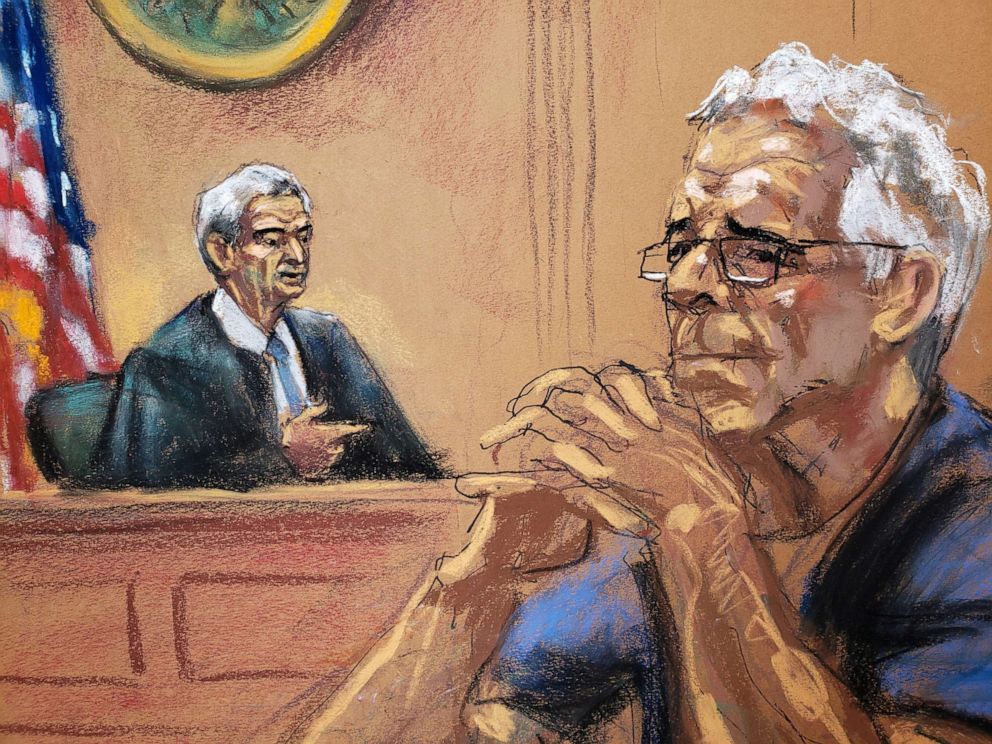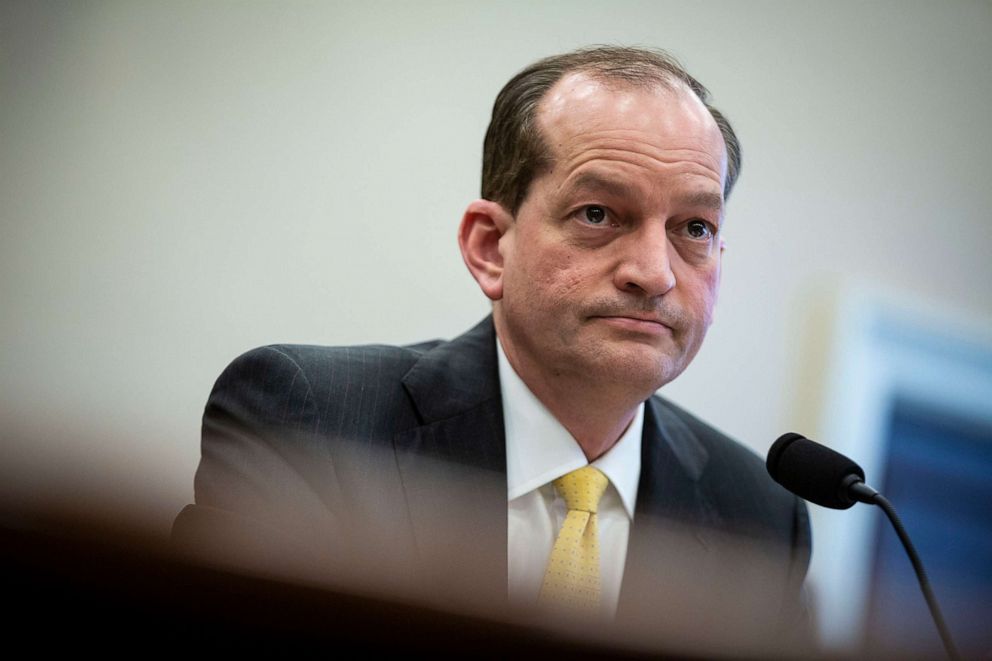Exclusive: Florida feds knew of New York victim in Epstein indictment 11 years earlier
Before her testimony could be secured, Epstein cemented a controversial deal.
A woman whose allegations of childhood sex abuse in New York were central to last year's indictment of Jeffrey Epstein was questioned by the FBI and subpoenaed for testimony by federal prosecutors in Florida more than a decade ago in connection with the first federal investigation into Epstein's alleged child sex trafficking, according to court documents and multiple sources familiar with the events.
But the woman, who was 19 at the time of her initial contact with federal agents in 2008, did not appear before a grand jury in West Palm Beach, as the subpoena commanded. Before her testimony could be secured, Epstein cemented a controversial and once-secret non-prosecution agreement with the U.S. Attorney's Office in Miami by pleading guilty to two state prostitution charges for which he was sentenced to 18 months in a county jail.
The woman's account could have helped prosecutors strengthen an already expansive case against Epstein, by potentially unraveling an alleged network of child sexual abuse at his Manhattan residence that mirrored what had been uncovered at his home in Palm Beach. But with the deal done, the federal grand jury was suspended, the investigation halted, and the subpoena to the woman, ultimately, withdrawn.
"I certainly think with the FBI's capabilities, even back then, that they could have unraveled the entire network from New York to Paris to New Mexico," said Spencer Kuvin, a West Palm Beach attorney who represented three of Epstein’s alleged victims during the original federal investigation in Florida. "The potential was always there. [The government] shut this thing down and pled this thing out before going through and talking to probably more than half of the women that were involved in this whole thing. Had they conducted a full investigation and taken their time, this would've been a whole different story.”
It wasn't until nearly 11 years later, when federal prosecutors in New York quietly opened a new investigation into Epstein, that the woman was again contacted by authorities seeking details of her alleged years-long sexual abuse by the multi-millionaire financier. Identified in last year’s indictment as “Minor-Victim 1,” she is the only alleged victim from New York whose allegations are specifically detailed in the charges, a strong indicator of her importance to the investigation.
According to the allegations contained in the indictment, the woman claimed she was initially recruited in 2002, at age 14, to provide massages to Epstein at his palatial Manhattan townhouse, and that she ultimately suffered sexual abuse that escalated over a period of years. Epstein allegedly enlisted one or more of his employees to schedule appointments with the girl and also encouraged, enticed and paid the teenager, whose family was in dire financial straits, to bring other young girls to engage in sex acts with him.

The woman, now 31, filed a civil lawsuit against Epstein’s estate following his arrest and his death by apparent suicide in a federal detention center last August, alleging that Epstein’s abuse "has forever scarred her and altered her life." The lawsuit, filed under a pseudonym, makes no mention of her prior contact with federal authorities, but it does lay out in harrowing detail the breadth of the abuse she allegedly endured as a vulnerable young girl.
“[Her] experience with Epstein fit within what is now known to have been a common pattern for the abuser," the complaint says. "He would find vulnerable young girls who needed money and slowly test their boundaries—first asking them to remove their own clothes and massage him and then, over time, he would escalate his conduct, touching them in ways that would become more invasive, violent, and painful. As these children grew to rely financially on Epstein, he would only cause them more and more harm."
An attorney representing the woman -- whose identity is known to ABC News but is being withheld to protect her privacy – declined to comment for this report. A spokesperson for the U.S. Attorney's Office in the Southern District of New York also declined to comment.
Marie Villafaña, the former Florida federal prosecutor who led the U.S. Attorney's Office investigation of Epstein and prepared a draft 53-page indictment against him, is said to be "heartbroken" over the outcome of the initial investigation, according to sources familiar with the investigation. She also declined to comment but her attorney, Ty Kelly, issued this statement on her behalf.
“Because the Department of Justice has declined to waive privilege over the Epstein matter, Ms. Villafaña is prohibited from discussing this matter and her opinions on the outcome in greater detail," the statement reads. "If the Department were to waive that privilege, she believes it would provide a fuller and more accurate picture of how she handled this matter and how she advocated for victims at every turn.”
The FBI agents’ first visit with the woman in New York – in the early Spring of 2008 – came at a particularly sensitive time in the federal investigation, which was being overseen by R. Alexander Acosta, then the U.S. Attorney in the Southern District of Florida.
Several months earlier, in September of 2007, Epstein had signed a deal with Acosta’s office, which would shelve a potential federal indictment for multiple child sex crimes that had been under investigation by the FBI and Acosta's prosecutors for more than a year. In exchange, Epstein agreed to plead guilty to two comparatively minor prostitution charges in a Florida state court, register as a sex offender and pay restitution to dozens of alleged victims of his abuse in Florida.
"It's just downright unjust." said Sunny Hostin, a former federal prosecutor and senior legal correspondent and analyst for ABC News. "The deal does not match the significance of the evidence in the case.”

Under the terms of the agreement, Epstein was required to "use his best efforts to enter his guilty plea and be sentenced not later than October 26, 2007." But not long after the ink was dry on the agreement, disputes arose between Epstein's legal team and the prosecutors over the interpretation of the restitution clauses in the deal, resulting in a months-long delay in finalizing the terms, according to court records in a lawsuit against the Justice Department by victims who challenged the agreement.
After an amended deal was agreed upon in December of 2007, Epstein was granted even more time for his legal team to appeal to higher levels of the Justice Department in Washington, D.C., challenging the premises of the federal investigation and certain aspects of the non-prosecution agreement.
In a court filing responding to the victims’ lawsuit against the Justice Department in 2017, Villafaña wrote that after the signing of the agreement Epstein "made several attempts to avoid having to perform the obligations he had undertaken," and as a result, her office continued to proceed as though a trial of Epstein was still a possibility.
"The investigation continued up until the day that Epstein entered his state court guilty plea," Villafaña wrote.
It was during that period of delay and uncertainty that the FBI paid its visit to the young woman in New York. It's not clear what she said to the agents, but after the meeting, she placed a call to an associate of Epstein looking for guidance on how to proceed, according to sources familiar with the situation, and Epstein then provided an attorney to represent the woman in discussions with federal prosecutors, who were pressing for her testimony before a grand jury.
As the date of a potential grand jury appearance for the woman approached – with all of his appeals to the Justice Department having been turned away – Epstein scheduled a hearing in Palm Beach County and finally entered the required guilty pleas on June 30, 2008, nine months after signing the deal with the federal government.
No one can say for sure whether the prospect of this woman testifying was a factor in the timing of Epstein’s plea, or know with certainty what would have happened if she had testified. But she is yet another young woman who suffered in silence while Epstein walked free.
"[She] never received a high school education. She suffers from post-traumatic stress disorder, anxiety, and depression," her complaint says. "Her severe emotional injuries manifest in myriad ways: she often finds herself crying; she is unable to form healthy emotional relationships with men; she often cannot sleep through the night or fall asleep at all; she has panic attacks; and she is constantly afraid for her young daughter."




